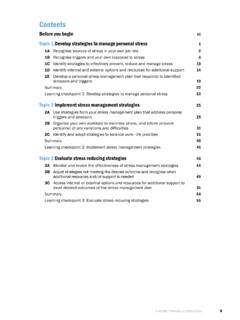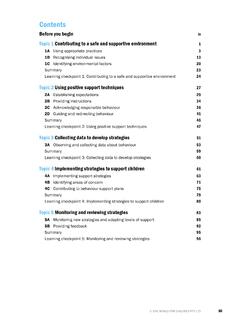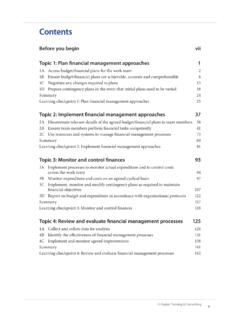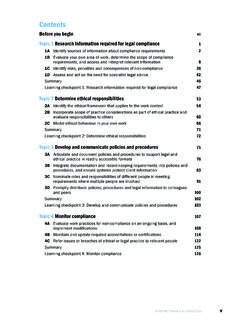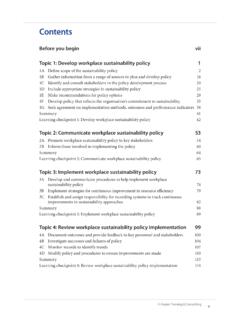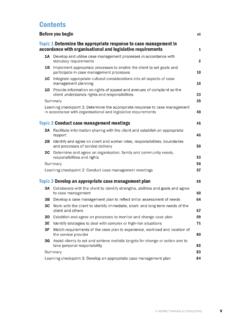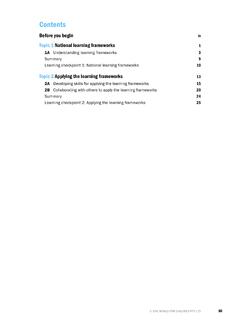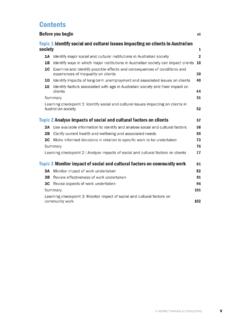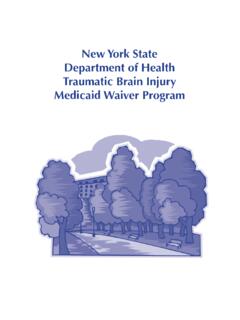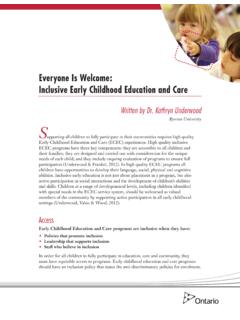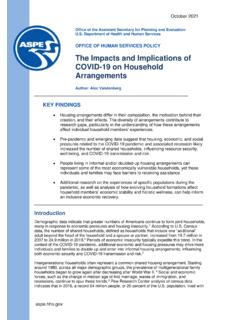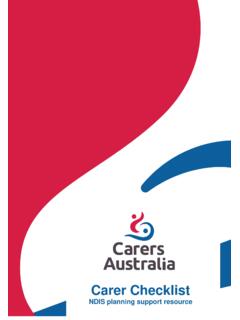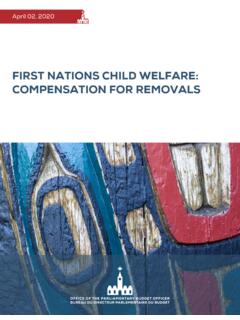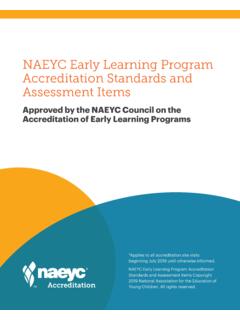Transcription of CHCMHS002 Establish self-directed recovery relationships
1 ASPIRE TRAINING & CONSULTING vContentsBefore you begin viiTopic 1 Promote principles of recovery and recovery -oriented practice 11A Respect the person as the author, definer and director of their own recovery journey 21B Work in ways that inspire hope for the future and belief in recovery 71C Identify and take into account personal values and attitudes 121D Consider and respect contribution of the person s whole of life situation in the recovery process 17 Summary 23 Learning checkpoint 1: Promote principles of recovery and recovery -oriented practice 24 Topic 2 Establish the context for a self-directed recovery relationship 272A Establish and maintain a safe, positive working relationship and environment 282B Identify and address the power dynamics impacting on the relationship 342C Build a relationship based on shared understandings and effective communication 382D Interact with the person showing warmth, openness, care and authenticity 472E Discuss, clarify and use the person s preferred language and understandings about their experience 532F Adjust communication strategies to meet cultural preferences 572G Clarify role expectations and define appropriate relationship guidelines 61 Summary 66 Learning checkpoint 2.
2 Establish the context for a self-directed recovery relationship 67 Topic 3 Invite information sharing 733A Invite the person to tell their story 743B Respond appropriately to clarify and check understanding of the story 783C Acknowledge situation and foster respect, dignity and hope 813D Recognise impacts of mental illness and diagnosis on the person s life and sense of self 893E Establish eligibility and priority for service and refer appropriately if required 943F Work within the context of the person s experiences, understandings and meanings to understand their needs 100 Summary 105 Learning checkpoint 3: Invite information sharing 106 ASPIRE TRAINING & CONSULTING 1 Topic 1In this topic you will learn how to:1A Respect the person as the author, definer and director of their own recovery journey1B Work in ways that inspire hope for the future and belief in recovery1C Identify and take into account personal values and attitudes 1D Consider and respect contribution of the person s whole of life situation in the recovery processPromote principles of recovery and recovery -oriented practiceRecovery is a term used in the mental health sector to refer to a person s ability to develop meaning and purpose in their life beyond the effects of mental illness, and gain a positive sense of self.
3 It encourages the person to regain personal power and recover from the stigma of mental illness. It means living a meaningful and satisfying life while affected by mental illness. A person with mental health needs has a right to direct their own recovery . They should be informed about their rights at every stage of treatment and care. They have rights to social inclusion, equity and access to the community and its resources like everyone else. They should be free of discrimination and prejudice. It is important to remember that recovery does not necessarily meant that the person is cured; recovery is about building a meaningful and satisfying life, as defined by the person themselves, whether or not there are ongoing or recurring symptoms or problems. ASPIRE TRAINING & CONSULTING 9 TopiC 1 PROMOTE PRINCIPLES OF recovery AND recovery -ORIENTED PRACTICEF unctional recoveryA person experiences functional recovery as they able to participate more in everyday life; for example, organise their financial situation and keep recoverySocial recovery sees a growth in the person s ability to participate in relationships and in the community.
4 This gives them more choice about accessing recovery -oriented practice is widely used to support a person with mental illness, assisting them identify services and strategies that support empowerment and recovery model: XXfocuses on fostering hope and empowerment in people who experience mental illnessXXsuggests people can recover from mental illness and regain a sense of identity that is not defined by their mental illnessXXdoes not necessarily mean a complete absence of symptoms but an ability to deal with and not be limited by to encourage recovery and a person s rightsRecovery is a term used in the mental health sector to refer to a person s ability to develop meaning and purpose in their life beyond the effects of mental illness, and gain a positive sense of self. It encourages the person to regain personal power and recover from the stigma of mental illness. It means living a meaningful and satisfying life even while affected by mental illness.
5 A person with mental health needs has a right to direct their own recovery . They should be informed about their rights at every stage of treatment and care. They have rights to social inclusion, equity and access to the community and its resources like everyone else. They should be free of discrimination and prejudice. Ellis and King (2003) stated that the following factors are conducive to conducive to recoveryXXKnowledge and acceptance that one has an illness, which often includes assuming a degree of personal responsibility for emotional wellbeingXXAppropriate medicine useXXSpirituality, which contributes towards hope or provides a sense of purpose XXCollaborative treatment planning, which creates a sense of partnership in managing the illnessXXSelf-monitoring and participation in management of illnessXXStrengths-based interventionsXXInformal support networks including family and friends14 ASPIRE TRAINING & CONSULTINGCHCMHS002 Establish self-directed recovery RELATIONSHIPSI dentify personal attitudes when planning and implementing activitiesA person s attitude to their own illness and the illnesses of others can be very persistent and resistant to change; others may be held more lightly.
6 The persistence of an attitude is probably related to the importance of the subject to the person who holds it; and many factors may contribute to this. In community service work, particularly in the mental health sector, projecting and maintaining a non-judgmental attitude is held to be important and this takes high-level communication skills to achieve. Workers attitudes to recovery , mental health and illness are crucial. The attitudes of people who receive services to recovery , mental health and illness are crucial. In the working relationship, the first step may be to identify attitudes on both sides; examine them; and reflect on whether they are positive, constructive and helpful to recovery , or negative, destructive and unhelpful to recovery . A shared understanding of this can be the start of a productive, supportive working relationship. Principle of empowerment Empowerment is a major principle of the mental health sector and drives the approach of mental health workers supporting people with mental health needs.
7 Empowerment is about power dynamics and encourages the idea that people with mental illness are the experts in their own lives. Empowerment supports these people and their families to make informed decisions and choices about their goals, needs and delivery of services. A disempowered person will find it difficult to make choices and decisions, and may see themselves only as is an outline of different traits that empowered and disempowered people typically of an empowered person Traits of a disempowered personXXDecision-making power in their own lifeXXDoesn t feel they have a say in their own lifeXXAccess to information and resourcesXXCan t make choices or solve problemsXXAssertiveXXStruggles to take on responsibilities, such as managing their own health or being a productive employeeXXUnderstands that people have rightsXXWill never be able to work or make their own way in lifeXXA positive self-image and overcomes stigmaXXFeels of little or no value as a personXXAn ability to contribute to the development and management of mental health services ASPIRE TRAINING & CONSULTING 23 TopiC 1 PROMOTE PRINCIPLES OF recovery AND recovery -ORIENTED has been a significant shift from older models of service provision in themental health is about building a meaningful and satisfying life, as defined by theperson who has mental health support needs, whether or not there are ongoing orrecurring symptoms or recovery -oriented approach sees a person with mental health support needs asthe primary decision-maker who can identify their own needs and goals and selectthe strategies.
8 Methods services and resources used to achieve those mental health value of recovery and empowerment implies consulting theperson at every stage of the recovery journey and valuing the contributions madeby the who use a recovery -oriented approach need specific skills to buildand maintain an effective collaborative relationship. Communication skills areimportant, along with awareness of factors such as personal values, stereotypesand assumptions about mental illness that might influence the collaborativerelationship between the worker and the person who receives must be aware of work role boundaries, as outlined in their positiondescription. They should consult their supervisor and organisational documentswhen uncertain about any aspect of their and territory legislation provides the legal framework for the care andtreatment of people living with mental illness, whether in the community or in apsychiatric facility. A range of national standards has been developed in Australiarelating to mental health person s whole of life situation can impact their recovery journey.
9 ASPIRE TRAINING & CONSULTING 29 TopiC 2 Establish THE CONTExT FOR A self-directed recovery RELATIONSHIP social, cultural and spiritual background and beliefs. If you avoid discrimination and prejudice and work in an environment that values access and equity principles, the person is more likely to feel supported and encouraged to contribute to their recovery . Cultural safetyA culturally safe environment is one in which a person s identity, cultural and otherwise, is not challenged. Culturally safe practices include actions that meet people s needs and respect their culture, identity and rights. Culturally unsafe practices diminish or disempower a person s cultural identity and wellbeing. Strategies to promote cultural safety:XXBe open-minded and flexible in attitudes towards people from cultures other than their aware of how your own cultural background influences your views and with others in a respectful dialogue where knowledge and respect is of cultural safetyA goal of cultural safety aims for outcomes that enable safe services to be defined by those who receive the services is met.
10 Before this can happen, cultural differences, which are not only cultural and religious traditions and food can be explored and acknowledged. Emotional, social, economic and political contexts may be relevant. For example, some cultures allow the open expression of emotion more readily than cultural factors can be empowering, as it legitimises difference and sheds light on aspects of a person s life experiences, including can read more about cultural safety at this website: cultural differencesMany people living in Australia are from a variety of different cultures and countries. These cultural differences lead to diversity, which often means there are different languages or ways of behaving that affect communication. You need to know how to change your communication to suit the culture of the people you are working with. For example, when Japanese people greet each other they often bow to each other. This is the same for males and females.
